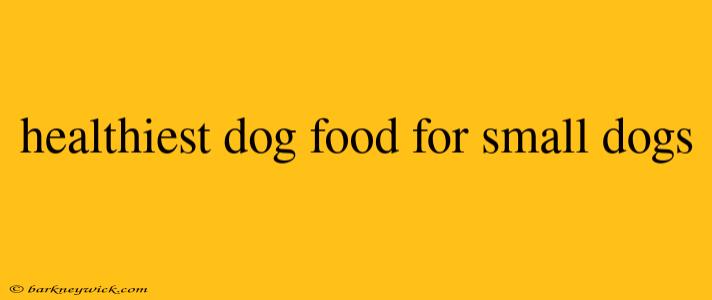Finding the healthiest dog food for your small dog can feel overwhelming with so many options available. But it doesn't have to be! Here's a guide to help you choose the best food to keep your furry friend happy and healthy:
Key Considerations:
- Life Stage: Puppies, adults, and senior dogs have different nutritional needs. Look for formulas specifically designed for your dog's age.
- Breed: Some small breeds have unique dietary requirements, like toy breeds often needing higher calorie density.
- Ingredients: Choose foods with real meat as the first ingredient, avoiding artificial colors, flavors, and preservatives.
- Protein: Small dogs need a higher protein content than larger breeds for energy and muscle maintenance.
- Fat: Healthy fats, like those from fish oil, support skin and coat health.
- Fiber: Adequate fiber aids digestion and can help prevent weight gain.
Types of Dog Food for Small Dogs:
- Dry kibble: This is the most common type, offering convenience and affordability. Look for kibble pieces designed for small mouths.
- Wet food: Wet food is often more palatable and provides higher moisture content, which is beneficial for dogs prone to urinary tract issues.
- Raw food: This diet consists of raw, unprocessed meat, bones, and vegetables. It can be highly beneficial for some dogs but requires careful preparation to ensure safety.
- Homemade food: You can create balanced homemade meals for your dog, but this requires a lot of research and careful monitoring. Consult with a veterinarian to ensure your recipes provide complete nutrition.
Choosing the Right Food:
- Read labels carefully: Pay attention to the ingredients, the guaranteed analysis, and the recommended feeding guide.
- Consult with your veterinarian: They can provide personalized recommendations based on your dog's specific needs and health status.
- Start slowly: Gradually transition your dog to a new food by mixing it with their old food over a week.
- Monitor your dog's health: Look for changes in appetite, energy levels, stool consistency, and coat health to ensure the food is agreeing with your dog.
Tips for Feeding Small Dogs:
- Portion control is key: Follow the feeding guidelines on the food label and adjust based on your dog's activity level and weight.
- Multiple meals: Small dogs often benefit from eating smaller meals more frequently throughout the day.
- Fresh water: Always provide clean, fresh water for your dog.
By understanding the key factors and choosing a high-quality food that meets your small dog's needs, you can provide them with the nutrition they need for a long and healthy life.
